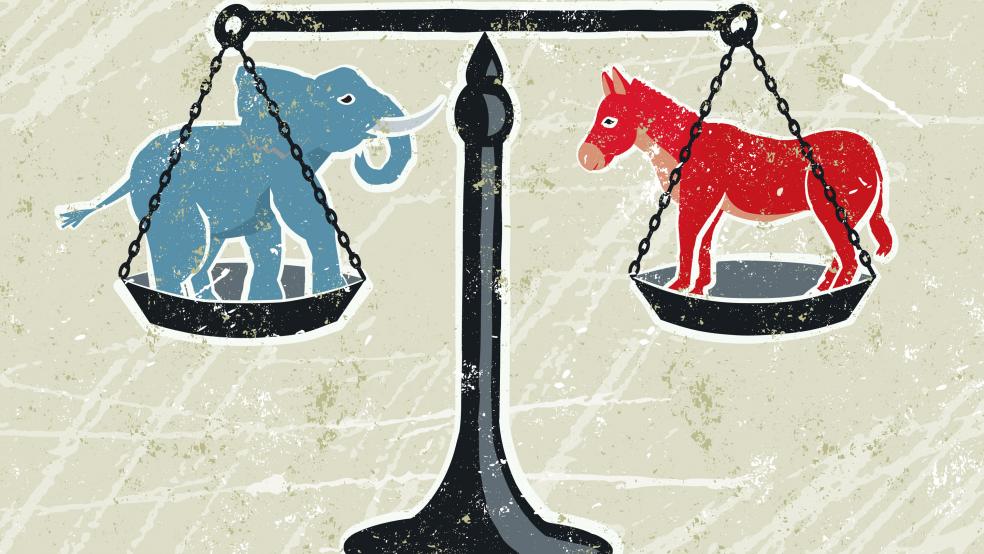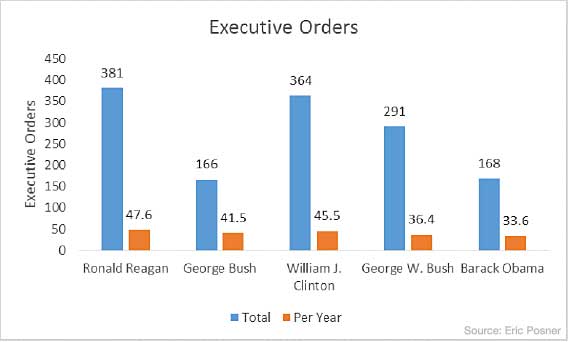I am not a big fan of the common view that Republicans and Democrats are equally guilty of various things that the general public abhors about the way Washington works. In my view, one side is almost always more guilty than the other. But there is one area where the common view is correct and that is when it comes to dealing with presidential overreach. When your side holds the White House, you defend it; when it doesn’t, you condemn it.
The latest example of this comes from President Obama’s State of the Union address this week. In it, he said he would bypass Republican obstructionism and use executive orders to implement his agenda wherever possible. For example, Congress has thus far refused to raise the minimum wage for all workers, but he says he will require that all federal contractors do so, which is within the president’s power. It’s not much, but it’s something.
Related: Obama’s SOTU Wish List—What Will He Get Done?
Republicans were quick to attack Obama’s “imperial presidency.” In a Wall Street Journal article obviously written well before Obama’s speech Tuesday night, Senator Ted Cruz, Republican of Texas, accused the president of a “persistent pattern of lawlessness” and a “willingness to disregard the written law and instead enforce his own policies via executive fiat.”
All the press attention this week on Obama’s executive order strategy is a little silly since he’s been using it as long as he has been in office. A Feb. 13, 2010 article in The New York Times is titled, “Obama Making Plans to Use Executive Power.” Another article in that paper on April 22, 2012 is titled, “Shift on Executive Power Lets Obama Bypass Rivals.” And last year at this time, The Washington Post published a story with the title, “Obama Weighing Executive Actions on Housing, Gays and Other Issues.”
We heard the same thing during the Bill Clinton administration. Also frustrated by Republican obstructionism, he also said he would use executive orders to implement his agenda. On July 5, 1998, The New York Times quoted Clinton aide Paul Begala bragging about the new strategy: “Stroke of the pen, law of the land. Kind of cool.”
In 2000, Clinton aide Bruce Reed assured Democrats that there would be no letup in the executive order strategy. “The president will be signing executive orders right up until the morning of Jan. 20, 2001,” he told The New York Times.
Related: Obama Won’t Wait for Legislation to Advance 2014 Priorities
Then, as now, Republicans attacked the rise of the “imperial presidency.” But they were singing a different tune when Richard Nixon used executive orders to freeze all wages and prices, close the gold window and take other major actions on Aug. 15, 1971. Republicans stood behind him.
After Nixon was weakened by the Watergate revelations, he expanded his use of executive orders and executive privilege. In a series of articles in March 1973, The New York Times said his actions were unprecedented. Nixon, The Times said, “is attempting an expansion of presidential powers that could have more impact on the national government than that of any president since Franklin D. Roosevelt.”
During the presidency of George W. Bush, Republicans were huge fans of executive power and even argued in favor of the “unitary executive,” a theory which said that the president is pretty much all-powerful and could act decisively without Congress. As Prof. Dana Nelson of Vanderbilt University explained in a 2008 article:
Unitarians (for lack of a better word) want to expand the many existing uncheckable executive powers -- such as executive orders, decrees, memorandums, proclamations, national security directives and legislative signing statements -- that already allow presidents to enact a good deal of foreign and domestic policy without aid, interference or consent from Congress. Ardent proponents even insist that there are times when the president -- like a king -- should operate above the law.
The irony is that insofar as Obama has stretched the law, he did so using a firm legal foundation that was established by Bush. Nevertheless, Republicans like Sen. Cruz simply ignore this history and assert that Obama’s actions are unique and without precedent.
In truth, the whole issue of the imperial presidency was baked in the cake by the Founding Fathers, many of whom were in favor of giving the president king-like powers. Others, of course, thought Congress should hold all power, with the president as a mere errand boy. Without a clear line between executive and legislative power, we have been engaging in trial-and-error since 1789, with power ebbing back and forth depending on circumstances, personalities, court cases and other factors.
Related: Obama’s Dismal Approval Ratings Take Another Dive
Insofar as Obama is concerned, he has actually been among the least aggressive presidents in recent history to use executive orders to implement his agenda. As University of Chicago law professor Eric Posner points out, Obama has issued far fewer executive orders per year than Ronald Reagan, George H.W. Bush, Bill Clinton or George W. Bush, as shown in the chart.
Ironically, those who believe in congressional primacy and fear executive overreach are partially responsible for the latter. They have championed use of the filibuster in the Senate to block even the most routine legislation and executive branch appointments. There doesn’t seem to be any logic to it except the assumption that whatever Obama wants is per se bad or that Republicans deserve to get something in return for every vote.
The result has been implementation of the so-called “nuclear option” in the Senate, where majority leader Harry Reid, Democrat of Nevada, engineered a sharp limitation on all filibusters against executive branch nominations. In short, overuse of the filibuster led to its demise.
Similarly, Congress’s refusal to act on many Obama initiatives creates inevitable pressure on him to act unilaterally. It would be much harder for him to do so in the face of a vote in Congress explicitly rejecting one of the policies he has implemented by executive order.
Therefore, one way Congress can restraint the president is simply by doing its job. Hold hearing on presidential proposals, have committee mark-ups and floor votes, have members of Congress stay in town once in a while instead of spending all their time raising money and running for reelection. That, rather than mindless obstructionism, is the best way for Obama’s congressional critics to achieve their goals and reclaim the moral high ground.
Top Reads from The Fiscal Times:







